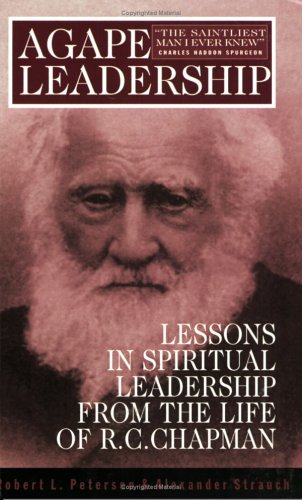
Quotes by Alexander Strauch
Behind most church fights and unresolved divisions is ugly human pride. And the worst kind of pride is religious pride, the Pharisaical pride of self-righteousness and superiority.
Leading With Love, Lewis and Roth, 2006, p. 167, Used by Permission. Get this book!
This is in no way to imply that love ignores or condones sin. Love covers a multitude of sins, not all sins. At times, love requires exposure and discipline of sin for the welfare of an individual as well as the church. Love knows when to cover and when to expose for the purpose of redemption and restoration.
Leading With Love, Lewis and Roth, 2006, p. 170, Used by Permission. Get this book!
Love is not just happy smiles or pleasant words. A critical test of genuine love is whether we are willing to confront and discipline those we care for. Nothing is more difficult than disciplining a brother or sister in Christ who is trapped in sin. It is always agonizing work – messy, complicated, often unsuccessful, emotionally exhausting, and potentially divisive. This is why most church leaders avoid discipline at all costs. But that is not love. It is lack of courage and disobedience to the Lord Jesus Christ, who Himself laid down instructions for the discipline of an unrepentant believer (Matt. 18:17-18).
Leading With Love, Lewis and Roth, 2006, p. 152, Used by Permission. Get this book!
Recognize that uncontrolled anger inflames emotions, exaggerates issues and hinders godly correction. It leads to be less rational and more self-justifying. It deals with people harshly. Loud, threatening talk can echo in a person’s mind for a lifetime.
God Himself is the supreme example of longsuffering. When we are tempted to be impatient with others, we should stop and think about the gracious longsuffering of God with us and our many wrongs against Him. In light of His patience toward us, who are we to think that we cannot patiently bear with the weaknesses and failures of others – or the wrongs they may have done to us?
Leading With Love, Lewis and Roth, 2006, p.41, Used by Permission. Get this book!
This new tolerance sees the specks of intolerance in the eyes of others, but can’t see its own logs of intolerance, dogmatism, pride, absolutism, discrimination, authoritarianism, and lack of love.
Leading With Love, Lewis and Roth, 2006, p. 162, Used by Permission. Get this book!
The fact is, no one is tolerant of everything. Tolerance itself is a neutral word. It is what one is tolerant of that makes it good or bad. Even those who cry the loudest for tolerance claim to have “zero tolerance” for sexual child abuse, rape, and racial discrimination – and so they should. Despite their assertion that they are moral relativists, they do have moral absolutes, and they are prepared to fight for them. They are more than willing to take strong disciplinary action in the workplace and in government agencies against those who violate those moral absolutes. Ironically, the so-called tolerance of secular relativism is quite intolerant of those who disagree with its philosophy of truth and ideological commitments. Numerous books and articles, from both secular and religious perspectives, have exposed the arrogance and hypocrisy of the relativist’s tolerance.
Leading With Love, Lewis and Roth, 2006, p. 162, Used by Permission. Get this book!
The [world] redefine[s] tolerance to mean not only respect and forbearance with regard to disagreement, but approval and acceptance of others’ moral and religious beliefs.
Leading With Love, Lewis and Roth, 2006, p. 160, Used by Permission. Get this book!
There is nothing wrong with Christian disagreeing with one another or trying to persuade another of the rightness of a particular position. What is wrong, however, is loveless conflict that ends in hate and bitterness.
Leading With Love, Lewis and Roth, 2006, p. 166, Used by Permission. Get this book!
[Forgiveness] – What a mighty power is love that can overcome evil, cover painful memories, forgive, forgo revenge and arrest resentment.
Leading With Love, Lewis and Roth, 2006, p. 73, Used by Permission. Get this book!
Christian love is never theoretical or abstract; it is always practical.
Leading With Love, Lewis and Roth, 2006, p. 111-112, Used by Permission. Get this book!
When their feelings have been hurt, people often feel justified in doing anything they want in retaliation. They can leave the church, divide the body, explode with uncontrolled anger, cut people off, lie, hate, and backbite. They try to justify the most wicked, sinful behavior with the simple excuse, “But I’ve been hurt!” Scripture, however, prohibits the spirit of retaliation, the get-even mentality that plagues human nature, with the clear command: “Repay no one evil for evil” (Rom. 12:17; 1 Thes. 5:15; 1 Pet. 3:9). When insulted, we are not to return the insult; when attacked, we are not to retaliate; when criticized, we are not to slander; when hurt, we are not to strike back. The Scripture further forbids seeking personal, private revenge or taking justice into our own hands; “Never avenge yourselves, but leave it to the wrath of God, for it is written, ‘Vengeance is mine, I will repay, says the Lord’” (Rom. 12:19). It is God’s prerogative to punish evil, and He will see to it…. Rather than seeking retribution, Christians are to “overcome evil with good” (Rom. 12:21).
Leading With Love, Lewis and Roth, 2006, p. 172, Used by Permission. Get this book!
Love can grow only if it is rooted in the soil of true obedience.
Do not tell people you will pray for them and then fail to do it. That is hypocritical love. Genuine love takes the promises of prayer to heart and follows through in keeping those promises.
Leading With Love, Lewis and Roth, 2006, p. 122, Used by Permission. Get this book!
Love bears up under the heavy load of life’s problems and sufferings. It holds steadfast and remains strong despite opposition, deprivation, and hard work. Love is courageous. It can carry enormous weight; thus loving leaders have an amazing ability to endure all sorts of suffering and frustration for the sake of others and the gospel (1 Cor. 9:12). This is a trait of all good shepherds (Gen. 31:38-40). They persevere and do not give up easily or fall apart under pressure.
Leading With Love, Lewis and Roth, 2006, p. 82, Used by Permission. Get this book!
Basic principles in confronting and rebuking in love:
1. Guard your attitude against pride, vindictiveness and impatience, but especially against anger.
2. Resist making quick accusations – you may not have all the facts straight and you may be wrong.
3. Think of all the words you will use. Furthermore choose the right place and time.
4. Use patience and Scripture.
5. Be gentle with people which means to be kind, tender, gracious and calm – not harsh or combative.
6. Balance reproof and encouragement and hope.
7. Pray for wisdom, courage and self-control. Also pray that the Lord would prepare the other person or persons to receive your reproof.
Adapted from: Leading With Love, Lewis and Roth, 2006, p. 143-149, Used by Permission. Get this book!
What Jesus prohibits…is sinful, improper judging. It is the hypocrisy of condemning others but failing to see one’s own glaring sins. Jesus forbids self-righteous criticism, a hypercritical spirit, and a harsh, fault-finding mindset.
Leading With Love, Lewis and Roth, 2006, p. 158, Used by Permission. Get this book!
Kindness is a readiness to do good, to help, to relieve burdens, to be useful, to serve, to be tender, and to be sympathetic to others. It has been said, “Kindness is love in work clothes.”
Leading With Love, Lewis and Roth, 2006, p. 44, Used by Permission. Get this book!
When facing a conflict, the first and most important thing to remember is this: Be Spirit-controlled, not out of control.
Leading With Love, Lewis and Roth, 2006, p. 166, Used by Permission. Get this book!
As Christian leaders we will be required to admonish and rebuke. In fact, a good deal of time may be spent doing this work. It is an important aspect of ministry not to be neglected because it is used by God to rescue people from sin and deception. You will never know until heaven the full extent of good you have done for others by rebuking them about sin or warning them about false doctrine.
Leading With Love, Lewis and Roth, 2006, p. 142, Used by Permission. Get this book!
We should, of course, seek to continually improve our skills in leadership, personal discipline, time management, interpersonal relationships, and teaching. But above all these things, we should seek to increase our knowledge and enjoyment of Christ and deepen our love for Him (Phil. 3:8-14). After all, the deeper our love for Him the more we will become like Him in love and the more we will be able to teach others to love. There is, therefore, hardly anything better we can do for those we lead than to love the Lord Jesus Christ supremely and keep our love relationship with Him fresh and growing every day! Out of this blessed and holy love relationship will come a greater manifestation of God’s love in us, shining out to others and drawing them to Christ.
Leading With Love, Lewis and Roth, 2006, p.30-31, Used by Permission. Get this book!
Good teachers are approachable and easy to talk to; they are not irritable, defensive, or quick to argue with people who disagree… [They] must not lose their temper, scold their students, yell at them, or seek revenge because they offend… Angry…teachers generate fear and stifle the spirit of inquiry, especially in children and adolescents.
Leading With Love, Lewis and Roth, 2006, p.130-131, Used by Permission. Get this book!
Prayer requires effort. When we pray for people, we focus our thoughts on them; we take their burdens upon ourselves; we intercede before God for them; we sacrifice our time for them; we commit ourselves to their wellbeing. We demonstrate true care and compassion.
Leading With Love, Lewis and Roth, 2006, p. 11, Used by Permission. Get this book!
Boasting or bragging is a sinful preoccupation with oneself. Braggarts crave attention. They want others to praise their abilities, knowledge, successes, and even their sufferings for God. Because they desire recognition, they speak too highly and too much of themselves, although they may have nothing significant to say.
Leading With Love, Lewis and Roth, 2006, p.51, Used by Permission. Get this book!
What a colossal failure it is for church shepherds to do everything but feed God’s flock. The Bible is the believer’s food. Continual nourishment through the milk and meat of God’s Word is what they need for protection and growth. Loving leaders and teachers will labor diligently to meet that need.
Leading With Love, Lewis and Roth, 2006, p. 127, Used by Permission. Get this book!
If you are not a positive encourager, you will probably be a poor admonisher.
Leading With Love, Lewis and Roth, 2006, p. 148, Used by Permission. Get this book!
Hudson Taylor, founder of the China Inland Mission, believed that if money could motivate the merchants of England to cross life-threatening oceans and enter the interior of China at great personal risk of loss of life, could not the love of Christ motivate missionaries to do the same for the sake of the gospel?
Leading With Love, Lewis and Roth, 2006, p. 29, Used by Permission. Get this book!
Most often, people who say that others have no love are themselves the ones most lacking. They think the new commandment says, “Love me or I’ll destroy you and your church.” They sit around waiting for other people to love them. How easy it is to see the speck of lovelessness in another’s eye but miss the log of self-centeredness, hypocrisy, and anger in your own eye (Matt. 7:3-5).
Leading With Love, Lewis and Roth, 2006, p. 87-88, Used by Permission. Get this book!
Out of love for those you lead, commit yourself to improving your intercessory prayer. Ask yourself, If those I lead were dependent on my prayers, how would they do?
Leading With Love, Lewis and Roth, 2006, p. 123-124, Used by Permission. Get this book!
Knowledge without love inflates the ego and deceives the mind. It can lead to intellectual snobbery, an attitude of mockery and making fun of other’s views, a spirit of contempt for those with lesser knowledge, and a demeaning way of dealing with people who disagree.
Leading With Love, Lewis and Roth, 2006, p. 11, Used by Permission. Get this book!
Imagine a father who claims to love his children but takes no action to stop them from becoming drug addicts or prostitutes. Or imagine seeing a brother in Christ walking alone heading straight toward quicksand, but you say nothing and walk away in silence. This isn’t genuine love; it’s apathy. It is not loving one’s neighbor as oneself; it is not loving as Jesus loved. Yet this is what we are like when we refuse to correct a wayward believer, to reprove sinful behavior, or to warn others of false teachers.
Leading With Love, Lewis and Roth, 2006, p. 137, Used by Permission. Get this book!
Recommended Books




